TOP E-commerce Websites in the US – SEO Analysis

Having an e-commerce website is becoming increasingly popular as website builders (such as WordPress), and e-commerce platforms (Shopify, BigCommerce, etc.) make it easier for businesses to manage an online store. In fact, it is estimated that there are now more than 24 million e-commerce sites around the world. Yet, despite this, less than one million of those online stores have revenues greater than $1,000/year. So, what makes some of those stores successful while others have almost no sales at all?
Table of contents:
- SEO Analysis of biggest e-commerce companies in the US
- Top 5 US E-commerce Websites
- US E-commerce Marketplace Websites
- Final Analysis of SEO for the Top US E-commerce Stores
Search Engine Optimization (SEO) is often the difference for the top e-commerce stores in the United States. SEO is the process of improving a website to show up higher on Google and other search engines. This organic type of marketing has become an increasingly important factor in building a successful online store. Big companies invest huge budgets into SEO to maintain a competitive advantage in organic traffic and search engine result page (SERP) rankings. Even large brands with a global retail presence or a company history dating back hundreds of years are investing in SEO as a way to grow their online sales. In this article, we will perform top e-commerces in US analysis to check their results.
SEO Analysis of biggest e-commerce companies in the US
When it comes to SEO for e-commerce websites, a few universal factors will impact a website’s search engine visibility. If you want to make an e-commerce store stand out, you’ll need to follow the SEO best practices below:
- Google considers strong backlinks to be a sign of trust, authority, and popularity. The top-ranking e-commerce websites find ways to grow the natural backlinks pointing to their store from other high-quality websites.
- The structure of a website needs to be easy for users to navigate and for search engine bots to crawl. That means developing organized site architecture, well-planned internal linking, easy-to-use main navigation, and more.
- Content on the website should provide unique value to the users. Why should your product listing show up at the top of Google’s search results? If you are reselling a product from another manufacturer, what makes your listing better than another reseller or the product manufacturer?
- In addition to providing unique value, your content should be optimized for the keywords and phrases searchers use. Well-researched keywords should naturally be incorporated into the text, headings, titles, meta descriptions, URLs, and image alt text.
- Finally, user engagement is an essential factor in search engine algorithms. Google wants to provide a good experience when a user clicks on a link. Providing the best experience for visitors and online shoppers will help improve rankings. To do this, the website should load quickly, offer a good UX design, and make it easy for users to take actions (like making a purchase or adding a product to their cart).
Top 5 US Ecommerce Websites
Famous brands and big companies have created online stores on their websites, making it easier for customers to make purchases from anywhere at any time. These websites have ultimately shaped the way we make purchases today, and it is considered the future of retail. Whether you’re ordering gifts for someone, getting a grocery delivery, or making your eighth Amazon purchase of the week, e-commerce websites do it all.
So let’s dive deep into SEO for some of the top e-commerce websites in the US. Of course, when analyzing the top e-commerce websites in the US, we expect them to cover the SEO fundamentals and best practices. But, what makes the difference for the brands that rank among the most popular websites in the US? In most cases, it is millions of backlinks from trusted websites and tons of unique content spread throughout millions of web pages. If you want to know how to analyze e-commerce performance, keep reading!
Target
Estimated website traffic = 190 million visits/month (SimilarWeb desktop/mobile data)
Target is the second-largest department store chain, behind only Walmart in the US, with over 1,800 physical locations. But, it earns its place on this list based on its impressive expansion into the e-commerce world. Target’s e-commerce sales in the US are expected to be over $18 billion this year. Target offers a variety of ways people can shop via the internet, whether that’s ordering home goods, clothing, bath products, or getting groceries delivered.
Below are images of SEO analytics that estimate Target.com’s performance according to online SEO tools SimilarWeb, SEMrush, and Ahrefs.

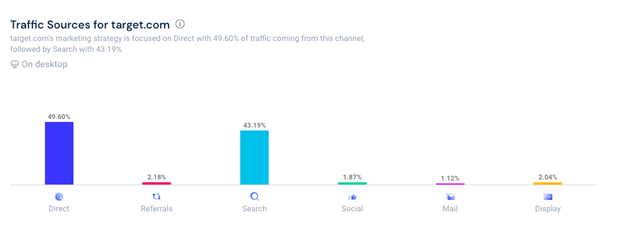


Home Depot
Estimated website traffic = 195 million visits/month (SimilarWeb desktop/mobile data)
Home Depot – the leading home store in the US, has grown its e-commerce sales significantly over the last decade by focusing on SEO. Founded in 1978, Home Depot has been prioritizing SEO and building its website’s presence for a while now. As a result, of the 5 US e-commerce websites listed here, Home Depot has the most pages indexed on Google, with over 9 million pages.
However, back in 2012, the company was using spammy and deceptive practices that caused them to receive a penalty and led many of their product pages to fall off the first page of Google. Within a few months, the website had resolved the issue, and Home Depot has spent the remainder of the last decade building high-quality backlinks more naturally.
If you want to know more about Google’s penalty check our entry: 9 Reasons Why Your Website Deserves a Google Penalty (And How to Fix It)
Below are images of SEO analytics that estimate HomeDepot.com’s performance according to online SEO tools SimilarWeb, SEMrush, and Ahrefs.

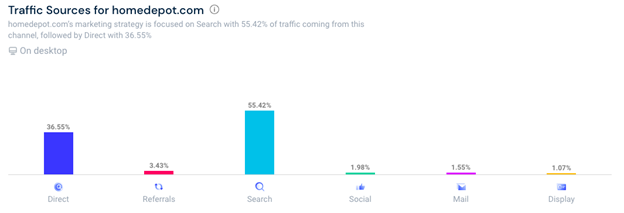


Lowe’s
Estimated website traffic = 120 million visits/month (SimilarWeb desktop/mobile data)
Lowe’s, the direct competitor to Home Depot, has more than 2,000 stores throughout the country. In addition to these physical store locations, Lowe’s has been building an e-commerce platform that rivals Home Depot. Lowe’s has created over 4 million pages that showcase its complete product offering while providing educational resources and helpful guides to compete in the construction materials, DIY, home and garden, and tool space.
Below are images of SEO analytics that estimate Lowes.com’s performance according to online SEO tools SimilarWeb, SEMrush, and Ahrefs.

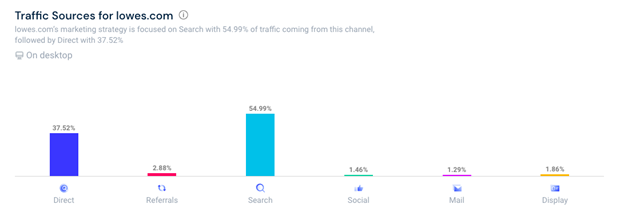


Best Buy
Estimated website traffic = 120 million visits/month (SimilarWeb desktop/mobile data)
Best Buy is one of the top online retailers known for selling a variety of electronics, from televisions to computers and cell phones. Best Buy is viewed as the go-to retailer and online store for many people’s electronic needs. Founded in the 1960s, they have an established national brand that they could utilize to build one of the top e-commerce websites. Best Buy has made it a point to invest a lot into their online retail presence and make the user experience between the online store and the physical store cohesive. For example, they’ve created the Best Buy app to pair their online store hand in hand with a physical Best Buy store.
Below are images of SEO analytics that estimate BestBuy.com’s performance according to online SEO tools SimilarWeb, SEMrush, and Ahrefs.

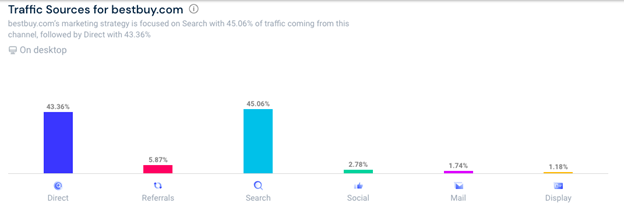


Macy’s
Estimated website traffic = 75 million visits/month (SimilarWeb desktop/mobile data)
Macy’s is an American company that launched back in 1858. With over 150 years to grow their global brand, Macy’s has become a powerhouse in fashion and clothing. Macy’s has leveraged its brand to become the top e-commerce website in the fashion and apparel industry, with top rankings on Google for keywords related to clothing, shoes, beauty products, and more.
Below are images of SEO analytics that estimate Macys.com’s performance according to online SEO tools SimilarWeb, SEMrush, and Ahrefs.

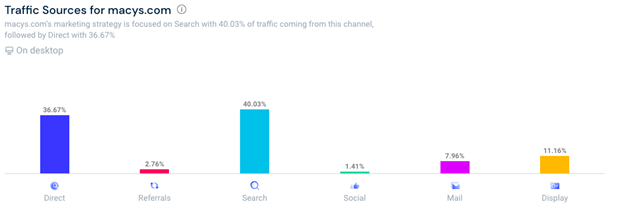


Other Top Websites With Online Stores
Websites like Adobe.com, Apple.com, and Office.com blur the lines of an e-commerce website. These websites feature an e-commerce platform as well as an integrated technology-focused product. Users frequently visit these websites for documentation, instructions, guides, login access, and more unrelated sessions to their online shopping options. As a result, we’ve left these websites off our top US e-commerce website SEO list, but they are still worth acknowledging.
US Ecommerce Marketplace Websites
Because there are so many e-commerce sites worldwide, it’s often difficult for smaller retailers to get noticed without SEO. So rather than try to create and optimize their e-commerce website, some retailers choose to join an existing marketplace.
E-commerce marketplaces allow sellers and consumers to come together while the website plays a third-party role. On these websites, a seller lists a product on the market and is responsible for fulfilling any orders. The marketplace platform creates a shared space for consumers to discover products, making it easier to purchase from multiple sellers within a single website. Therefore, the marketplace website doesn’t own, produce, or ship the product; instead, the marketplace takes a percentage of the sale (and other fees) to create revenue.
Everyone knows about the most popular US e-commerce marketplaces, Amazon and eBay. But, there are still other popular e-commerce marketplaces that address specific niches. Below are two US marketplace websites that approach e-commerce in a different way than most online marketplaces.
Etsy
Estimated website traffic = 390 million visits/month (SimilarWeb desktop/mobile data)
Founded in 2006, Etsy has quickly become one of the top e-commerce marketplace websites in the US. Etsy is known for many unique handmade and vintage items, which attract visitors to the platform to browse the cool things they can find. It has quickly become a marketplace that helps small business owners make a name for themselves and sell personalized or homemade products to a variety of customers. Creating a company profile on Etsy may be more cost-effective and less time-consuming than SEO for some businesses in competitive creative niches.
Craigslist
Estimated website traffic = 300 million visits/month (SimilarWeb desktop/mobile data)
Finally, we have Craigslist, another long-time marketplace that most people don’t think about when thinking about e-commerce. Yet, with more visitors than Netflix, this website has deserved a special mention on any list of SEO for US e-commerce websites. Founded in 1995, the Craigslist website offers everything from clothing to jobs, houses, electronics, and more. Typically, the items promoted on Craigslist are often one-off, used, or second-hand, rather than a large stock of products that are produced to be sold to many customers in an online store. Plus, craigslist transactions tend to focus on a local exchange with some negotiation rather than a more traditional buying experience.
Other Popular US Online Marketplace Web
Amazon estimated website traffic = 2.45 billion visits/month (SimilarWeb desktop/mobile data).
eBay estimated website traffic = 790 million visits/month (SimilarWeb desktop/mobile data).
AliExpress estimated website traffic = 440 million visits/month (SimilarWeb desktop/mobile data).
Walmart estimated website traffic = 410 million visits/month (SimilarWeb desktop/mobile data).
Final Analysis Of SEO For The Top US E-commerce Stores
This article briefly analyzed the top 5 e-commerce websites in the US to see why these websites rank so well. First, we recognized that each of the websites has millions of pages and millions of backlinks. As a result, 40.0%-55.4% of the traffic to these websites currently comes from organic search, compared to only 1.1%-11.2% for paid display ads. The breakdown of traffic for these sites alone is enough to showcase SEO’s potential return on investment for these big companies.
We also looked at two niche e-commerce marketplaces and explored the topic of growing a business on a marketplace rather than building an independent website. But what is the outlook for the broader e-commerce industry? Is it worthwhile for companies to invest in SEO for the future?
Growing E-commerce Industry
E-commerce has become increasingly popular because it allows people to do business without worrying about the distance it would take to go to a store, and therefore the time it will take. According to data released by the US Census Bureau’s quarterly retail sales report, online sales are continuing an upward trend. In addition, the pandemic lockdowns in Q2 of 2020 brought e-commerce retail sales to new highs. Nasdaq envisions that by 2040, 95% of all purchases will be through online e-commerce transactions.
If you are wondering if you should consider entering the world of e-commerce, read our entry: 13 Reasons Why to Invest in E-commerce
With this industry growth in mind, it is certainly understandable that big companies are looking at the long-term advantages of building strong e-commerce websites.














